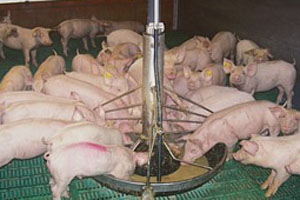Phytase summit takes pig nutrition to new levels

High phytase doses can benefit both pigs and poultry – but only when used correctly in feed formulations, said leading academics at the 2nd International Phytase Summit (IPS 2), which took place in Rome in December.
Phytase is being used increasingly by the animal production industry to destroy the anti-nutrient phytate that is present in many plant-based foodstuffs. But as well as championing the use of phytase, particularly for improving nutrient digestion, IPS 2 delegates advised caution when formulating feeds with increasing phytase levels.
In a session on phytase “mega-dosing”, Dr Craig Wyatt and Tiago dos Santos of AB Vista highlighted that levels of nutrient absorption do not necessarily improve in line with dosage increases – underlining the need for non-linear formulation. Later, Dr Hadden Graham, also of AB Vista, and Dr David Cresswell, of Cresswell Livestock Consulting (in absentia), addressed the much-questioned validity of high doses of phytase in low-phytate diets. Here, the presenters demonstrated that mega-dosing could indeed reduce feeding costs and maintain animal performance, though again depending on getting phytase levels and formulations exactly right.
Dr Aaron Cowieson of the University of Sydney talked in another session about using “nutritional geometry” in feed formulation. Dr Cowieson sees dietary calcium and phosphorus requirements as being interdependent across a range of values rather than having an absolute value. And going straight the root of the issue, Drs Charles Brearley of the University of East Anglia and Victor Raboy from the US Department of Agriculture reported on the ongoing development of low-phytate crops, by making enzyme changes at seed level.
Tiago dos Santos, Global Technical Manager, AB Vista, said: “AB Vista was delighted with the success of IPS 2, which we hosted jointly with Massey University, University of Maryland, Scothorst Feed Research and The University of Sydney. The discussions made a valuable contribution to the debate of how far we can go with phosphate replacement and creating a phytate-free world. I look forward to seeing the industry progress as a result of this meeting.”







